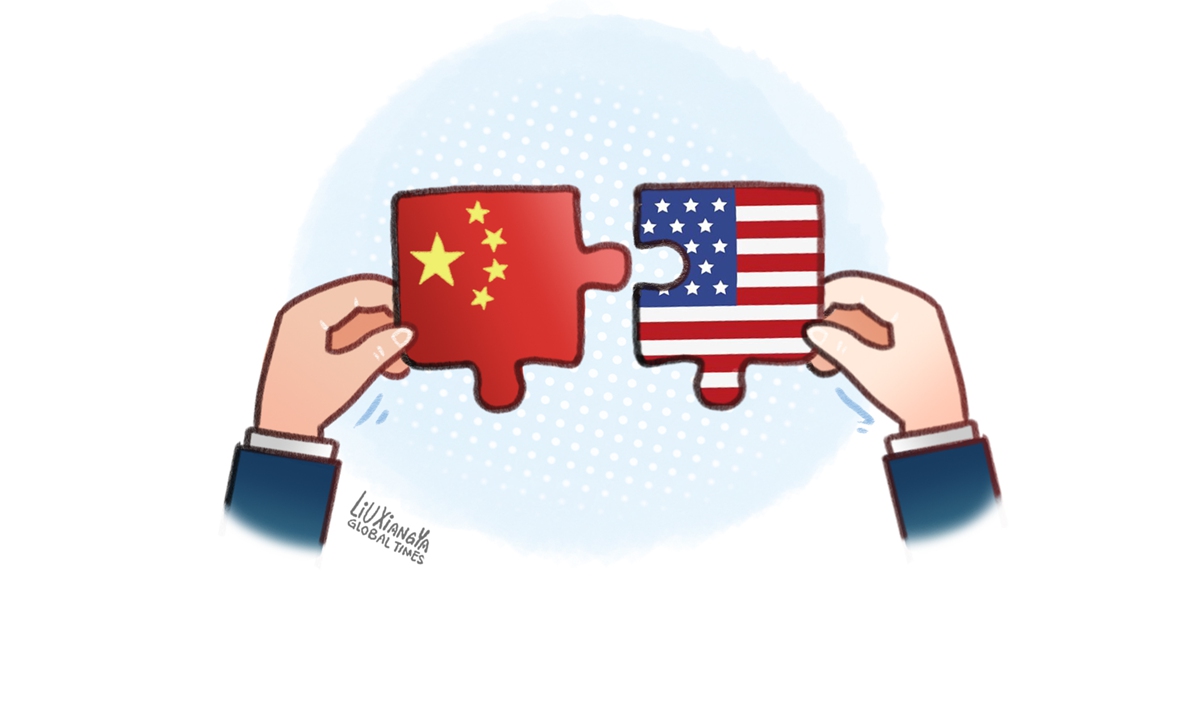
Illustration: Liu Xiangya/GT
The on-then-off-then-on-again visit by US Secretary of State Antony Blinken to China has taken place. But there is an important question that Chinese and other global leaders will be asking: Will what he said in China be backed by responsible actions from the US?
We should be skeptical.
First, we must acknowledge there were positives during Secretary Blinken's visit to Beijing. On the most basic level, he did not embarrass himself by lecturing Chinese officials about the world order and human rights. Thankfully, he appeared to have learned his lesson - avoiding any attempts to harangue Chinese leaders as he did when he and his counterparts met in March 2021 in Alaska, which was an embarrassing moment for the US side.
Video images of him talking to Chinese President Xi Jinping and other Chinese officials showed a serious but professional man, sometimes nodding his head and at other times taking notes. But he never demonstrated the aggressive posture or used any of the language connected to that terrible display of diplomacy shown in Alaska.
Next, he reaffirmed that the US will follow the one-China policy, which has been the foundation of US-China relations for five decades. To hammer home that point, Secretary Blinken said, "We do not support Taiwan independence, we remain opposed to any unilateral changes to the status quo." Absent such statements from senior American officials, US-China relations would collapse, and Washington would be to blame.
Unfortunately, we must anticipate that the secretary's words will not come with any meaningful actions when it comes to Taiwan: The US will continue to sell billions of dollars of sophisticated military weapons to Taiwan, and it will not stop its military exercises in the South China Sea. Both acts anger China, and the US seems quite happy doing that. Unnecessary visits by leading members of Congress to the island add more tension to the US-China relationship; those politicians know that but they bask in their arrogance by going there anyway.
Finally, the secretary said that the US would not decouple from China. At one point, he said the US was "prepared to cooperate with China" on critical economic issues. The word of the month in Washington is derisking, a hackneyed attempt to make people think the US economy will somehow be safer if the country expands its trade and manufacturing options. The bottom line: Washington will not publicly call for American corporations to exit the Chinese market, something no corporate executive wants to do.
Therefore, when Secretary Blinken left Beijing there was cautious optimism that US-China relations might be moving forward. Although there were no major breakthroughs during his trip, it enhanced the belief that another meeting between US President Joe Biden and President Xi might be possible later this year, possibly at the Asia Pacific Economic Cooperation meetings in November. One analyst went even further, suggesting that a visit by Xi to the US was a reasonable expectation. But much can change between now and November.
The central issue is what will the president do in the coming months to add to the successful meetings by US and Chinese officials in recent weeks Remember, a group led by Assistant Secretary of State Daniel Kritenbrink met with several Chinese officials, including Ministry of Foreign Affairs Executive Vice Foreign Minister Ma Zhaoxu and Director General of the North American and Oceanian Affairs Department Yang Tao in Beijing about two weeks before Secretary Blinken visited.
That meeting ended with both sides seeking to further dialogue and exchanges between public and private citizens from both countries. Similar sentiments were expressed at the end of Secretary Blinken's visit.
There are a couple of items President Biden should consider. One is to end the ridiculous tariffs on Chinese goods that have been in place since Donald Trump was in the White House. These tariffs hurt American and Chinese businesses and private citizens. Another one is that he should acknowledge and respond positively to China's concerns about efforts to contain China. As NPR recently reported, the "US has, in recent months, broadened its crackdown on China's semiconductor industry, and looked to expand and revitalize its alliances in Asia." It also has "deepened cooperation with AUKUS, a trilateral security pact it formed in 2021, and announced expanded access to bases in the Philippines." These moves, much like those related to Taiwan, allow the president to look tough, but more harm than good is being done.
The domestic political calendar will play a role in whatever President Biden does. In 2024, Republicans will begin selecting their presidential nominee, and all of them are virulently anti-China. Despite his long list of legal problems, Donald Trump remains the leading Republican contender; that guarantees that the bashing of China will be consistent and loud.
However, all of the Republican presidential contenders believe China wants to undermine US hegemony around the globe. With that in mind, Trump and his rivals will quickly bash President Biden for any positive overtures toward China. Suggestions that he is being weak or damaging national security by seeking better relations with China will score political points with voters, no matter where they fall on the political spectrum. The mainstream media - ever excited by the prospect of highlighting conflict - will quickly report any criticisms of Biden.
President Biden has an opportunity to change the Cold War mentality about China that exists throughout the political elite. Will he? Right now, the answer is probably no.
The author is an associate professor at the Department of Communication and Organizational Leadership at Robert Morris University. opinion@globaltimes.com.cn




